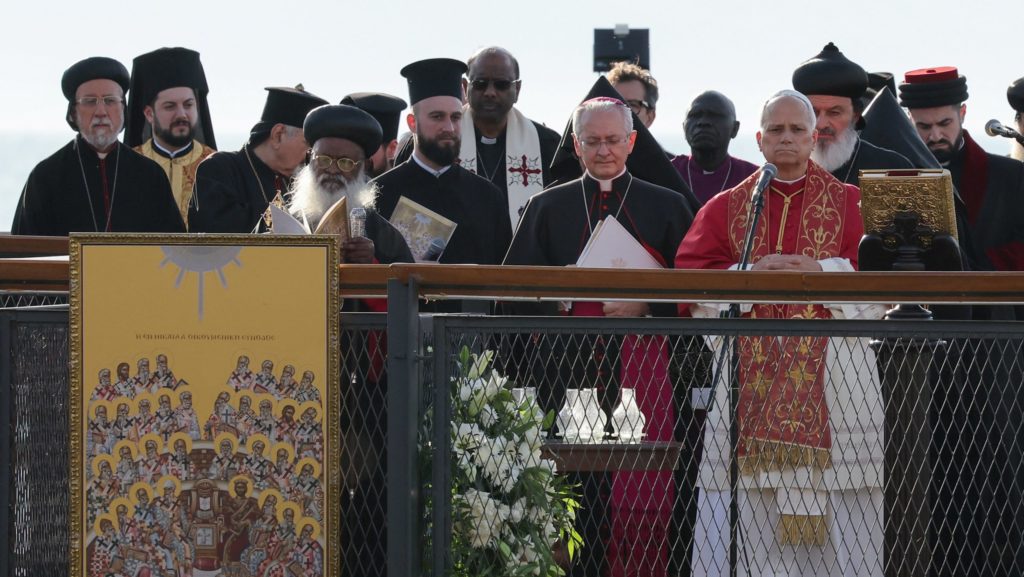Although the ancient city of Nicaea lies in ruins and the geographic center of Christianity has shifted West, Pope Leo XIV and Christian leaders gathered at an archaeological site in Turkey to celebrate the enduring faith set out in the Nicene Creed.
Orthodox Ecumenical Patriarch Bartholomew of Constantinople hosted the ecumenical prayer service and the common recitation of the Creed Nov. 28 at Iznik, site of the ancient Nicaea, about 80 miles southeast of Istanbul.
With the Greek Orthodox patriarchs of Antioch, Alexandria and Jerusalem or their representatives and with representatives of other Orthodox, Anglican and Protestant churches, Pope Leo marked the 1,700th anniversary of the Council of Nicaea -- the primary motive for his first foreign trip as pope.
The joint recitation of the Creed did not include the phrase known as the "filioque" -- the statement that the Holy Spirit "proceeds from the Father and the Son" -- since the phrase is not used by the Orthodox because it was inserted into the Latin Creed by Pope Benedict VIII in 1014.
Recent popes, including Pope Benedict XVI, Pope Francis and Pope Leo, have omitted the phrase at ecumenical prayer services.
Standing on a platform overlooking the remains of the Basilica of St. Neophytos, now partially submerged in Lake Iznik, the church leaders took turns leading the prayers -- in English, Greek and Arabic -- and lighting candles as a Catholic choir, singing in Latin, and an Orthodox choir, singing in Greek, alternated.
Patriarch Bartholomew, welcoming the pope and other guests, noted that "despite so many intervening centuries and all the upheavals, difficulties and divisions they have brought, we nevertheless approach this sacred commemoration with shared reverence and a common feeling of hope."
"The power of this place does not reside in what passes away, but in what endures forever," he said.
Speaking after the patriarch, Pope Leo told his fellow Christian leaders that at a time when humanity is "afflicted by violence and conflict," the world "is crying out for reconciliation."
"The desire for full communion among all believers in Jesus Christ is always accompanied by the search for fraternity among all human beings," he said. "In the Nicene Creed, we profess our faith 'in one God, the Father.' Yet, it would not be possible to invoke God as Father if we refused to recognize as brothers and sisters all other men and women, who are created in the image of God."
Though united by faith, the Russian Orthodox Church -- the largest of the world's Eastern Orthodox churches -- was not represented at the service. The Russian church broke relations with the Ecumenical Patriarchate over the recognition in 2018 of the autonomy of the Ukrainian Orthodox Church.
Belief in God the father, Pope Leo said in Iznik, means "there is a universal fraternity of men and women regardless of ethnicity, nationality, religion or personal perspectives."
With many of the Christian leaders, especially the Oriental Orthodox, coming from nations that recently faced or are facing war and persecution, Pope Leo said Christians must give concrete witness to their belief that all people are children of one God and therefore brothers and sisters to each other.
"Furthermore, we must strongly reject the use of religion for justifying war, violence or any form of fundamentalism or fanaticism," he said. "Instead, the paths to follow are those of fraternal encounter, dialogue and cooperation."
The pope also repeated a concern he had mentioned during a meeting with Catholic leaders earlier in the day: the risk that many Christians have departed from the Nicene Creed's firm belief in the divinity of Jesus.
"This question is especially important for Christians, who risk reducing Jesus Christ to a kind of charismatic leader or superman, a misrepresentation that ultimately leads to sadness and confusion," he said.
At the time of the Council of Nicaea, the pope said, Arius -- a priest from Alexandria in Egypt -- had denied the divinity of Christ, reducing him to "a mere intermediary between God and humanity, ignoring the reality of the Incarnation such that the divine and the human remained irremediably separated."
"But if God did not become man, how can mortal creatures participate in his immortal life?" Pope Leo asked.
The pope told the Christian leaders that sharing the same faith in Jesus and being able to recite the Creed together means there "is a profound bond already uniting all Christians."
"We are all invited to overcome the scandal of the divisions that unfortunately still exist and to nurture the desire for unity for which the Lord Jesus prayed and gave his life," the pope said. "The more we are reconciled, the more we Christians can bear credible witness to the Gospel of Jesus Christ, which is a proclamation of hope for all."
Patriarch Bartholomew told the leaders that with "the fervor of the faith of Nicaea burning in our hearts," they must "run the course" of Christian unity in fulfillment of Jesus' prayer for the unity of his disciples.
"And, finally," the patriarch said, "let us love one another that with one mind we may confess: Father, Son and Holy Spirit -- Trinity consubstantial and undivided."

